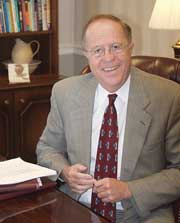bishop's perspective:
My opinion about war? Remember our principles
My dear sisters and brothers,
Grace and peace to you in the powerful name of our resurrected Lord and Savior.
This morning as I drank my coffee, I observed a territorial dispute between a bluebird and sparrow. The bluebird took possession of the feeder built by my son. We place seed in the feeder for all birds that visit our deck. There was enough for all, yet the sparrow was denied seed by the more powerful bluebird.
People often ask for my opinion on the pending war. I have an opinion birthed in struggle with the paradoxes inherent in our current war debate. But far more important than my perspective are the principles hammered out by the United Methodist Church in an attempt to reflect Biblical teachings.
Some ask, "What does the Bible say to us about war – this war?" The answer rests on our interpretation of Scriptures. I often hear, "I like Billy Graham because he simply preaches the Bible." Billy Graham, like the rest of us, interprets the Bible. In the absence of interpretation, the preacher would only read passages from the Bible and sit down. Even then, the selected passages would provide opportunity to reinforce one's own bias.
To assist us in interpretation of Scripture, we turn to the church for its collective wisdom developed over the centuries. The United Methodist Church has shaped these teachings in language reflective of Wesleyan theology.
On war and peace we say:
"We believe war is incompatible with the teachings and example of Christ. We therefore reject war as a usual instrument of national foreign policy and insist that the first moral duty of all nations is to resolve by peaceful means every dispute that arises between or among them ..." (¶165.C, The Book of Discipline) The United Methodist position troubles people on both sides of this issue.
Some are distrurbed by the statement that "war is incompatible with the teachings ... of Christ." They conclude that the United Methodist Church condemns and rejects all war. Others are offended by an apparent loophole which suggests that we "reject war as the usual instrument," but we may in unusual circumstances go to war.
Additionally, there is conflict between people who feel we are taking seriously – and those who believe we are not taking seriously – the admonition that it is our moral duty to "resolve by peaceful means every dispute that arises."
There is space for debate on each side of this issue. But it is crucial that we apply the church's social principles to our international disputes and call to arms. If we are not careful, we will divert the debate and dialogue about war to personal attacks over our differences.
I remind you of some additional teachings of the church:
"God's world is one world ... The enforced unity of humanity ... presents the church as well as all people with problems that will not wait for answer: injustice, war, exploitation, privilege, population, international ecological crisis, proliferation of arsenals of nuclear weapons ... This generation must find viable answers to these and other related questions if humanity is to continue on this earth." (¶165, The Book of Discipline)
Discussion of war with Iraq should be conducted in the larger context of God's vision for creation and humankind. This is a bigger cause than doves vs. hawks, conservatives vs. liberals, or true Christians vs. unfaithful Christians.
If we as Christians cannot have healthy debate rooted in respect for each other – if we cannot reconcile our own conflicts – how in the world can we expect resolution among nations?
How do we model for the world a commitment to reconciliation in our Christian disagreements over issues of war, doctrine, and sexuality?
As we struggle with our role as a nation, I offer this insight from the church:
"Some nations possess more military and economic power than do others. Upon the powerful rests the responsibility to exercise their wealth and influence with restraint ... We urge the major political powers to use their nonviolent power to maximize the political, social, and economic self-determination of other nations rather than to further their own special interests."
(¶165.B, The Book of Discipline) I wish the bluebird would live by these words. And us, too.
top
|

Bishop Ray W. Chamberlain
Resident Bishop
Cover Story
African-American Celebration
and Holston Members Views on War
Snow Job
C-Mail
Sawing & Hauling
Reading List
National & World News
Back to The Call Home Page
|
|





